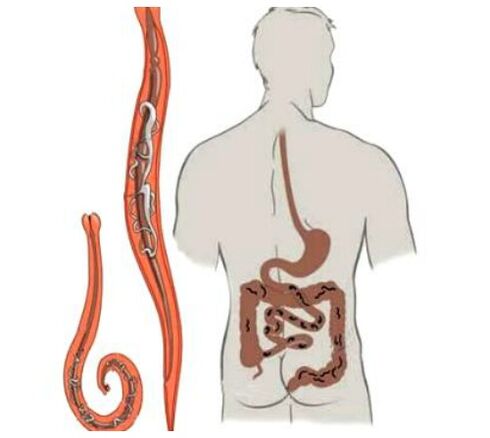The human body is an ideal environment for the habitat of pathogenic microorganisms that can affect almost any organ or system, causing numerous diseases and disorders. Among such organisms, a special place is given to the parasites that live and feed on the cells and other nutrients of the "owner" body. According to medical indicators, about 90% of the population of different age categories are carriers of parasites, treatment and studies that deal with the part of medicine - parasitology. The term "parasites" means living organisms of different species that have the ability, settlement in the human body, will be introduced in the tissues of the internal organs, eat cells, juices or digested food. Foreign organisms can penetrate any part of our body and live in it long or throughout the person's life. Some types of parasites in the human body do not cause special changes, but there are those who are able to negatively affect the well-being of the "host" and causes the development of some serious diseases. In such cases, we are talking about parasitic diseases that require the current treatment. In medicine, the parasites are called pathogenic organisms that lead parasitic lifestyle in the human body. They include various bacteria, viruses, fungi, as well as worms, simple, unicellular, arthropod, protozolic invasions and other types.
What are parasitic diseases?

Parasitic diseases (invasions) is a large group of diseases that causes various pathogenic organisms living and which are multiplied within a person. There are about 300 types of parasites that can affect the human body. Parasitic diseases may cause pathogens bacteria and parasitic protozoa, arthropod, unicellular and other parasites or viruses. The parasite list in the human body is quite large, but despite the type, almost all release toxins that destroy cell structures, damage to the lymph flow, which removes the body and disrupt the work of internal organs and systems.
Basically, pathogenic organisms spend nutrients that a person receives together with food. Perhaps this behavior of "uninvited guests" explains that many people who lead the real lifestyle, they monitor their health and food, do not receive the desired result, because these "sail" are dragging all the best, leaving a small particle of useful substances. These creatures are so much cunning that they are often disguised as other diseases, and the person can walk to doctors for years, but not noticed a positive result in treatment.
How do parasites fall into the human body?
Foreign organisms can penetrate the human body in several ways, but the most common infection occurs through:
- Water or soil infected with worms.
- Food products that have not passed the desired processing: poor fried meat, fish, dirty vegetables, fruits, dairy products.
- Contact with domestic or homeless animals.
- Insect bite.
- Inaction with the rules of personal hygiene.
- Close contact with parasite carrier.
Many parasites living in the human body do not have a nerve, cardiovascular or respiratory system, but their reproductive bodies are able to throw hundreds of thousands of ripe eggs in the environment. The eggs and larvae parasites are very stable, can be in the ground, leads, food or personal items for a long time. For example, Tapeworm eggs can withstand minus 15 degrees and maintain your vital activity for 9 months. Almost all parasites have such safeguards that cannot recognize and destroy the human body. Therefore, many parasitic diseases are difficult to diagnose. Pathogenic organisms can be in the intestines and in lungs, blood, liver, joints, brains, and even eyes. The place of localization of pathogenic organisms depends on their type and other features, and the person and the parasite themselves.
Parasites living in the body differ the substances that help them live in a person for many years. They don't have the digestive system, but, however, use only useful substances that enter the human body, which allows them to live for many years, while the person is slowly losing health, and does not doubt the truly reason.
Special organisms, in order to adapt to new conditions, use their "devices": pointed hooks, plates, heavy hair, suction cups that constantly injure the organ mucos. The parasites themselves may have a length of several millimeters in a few meters, they also have different toxins that poison the body as a whole, causing not only disruption in the operation of the gastrointestinal tract and overload the liver with their waste.
Signs and symptoms of parasite in the body

Parasites in the body - The symptoms of their presence can be absent or similar to the clinical manifestations of other diseases. For example, larvae in the lungs, causes pneumonia symptoms, Pinworms - attack nalebit and parasites - were of a biliary tract or a pancreatitis attack.
In addition, parasitic diseases can common colds, sore throat, bronchitis and other diseases. You can doubt the presence of the parasite in the human body according to the following symptoms:
- Disorders in the operation of the gastrointestinal tract: diarrhea, bloating, frequent prison, irritating intestinal syndrome
- Joints in the joints and muscles
- Allergic leather reactions
- Anemia: Many "Sufitants" feed on blood, leading to the development of anemia's lack of iron
- A reduction or increase of body weight
- Violations in the work of the psyche. Toxins that distinguish parasites have a destructive effect on the nervous system, causing a person to increase irritability, nervousness, frequent depression, panic attacks and other disorders
- Brookssism - Zub rattle in a dream
- Intestinal Dimbiosis
- Violations in the work of the immune system. Many worms and parasites reduce the production of immunoglobulin A, which time leads to a reduction in immunity. A person is a completely dam without viral and infectious diseases
- Respiratory paths inflammatory processes
- Oncological diseases. The long-term finding of the parasite in the body causes a significant reduction in immunity and degeneration of epithelial cells into cancer
In addition to the above symptoms, parasitic invasions often damage liver, kidneys and the cardiovascular system, leading to violations in their work and developing many diseases that are difficult to give treatment. It is important to note that all of the above signs of parasites in the human body are not the correct confirmation of their presence. Only professional and high diagnostics will help determine the presence or absence of "uninvited guests".
How to recognize parasitic disease
It is quite difficult to diagnose the presence of Helmintha, especially immediately after the infection. Until recently, the only way to identify "foreigners" was a lawsuit and feces analysis. The results of such studies have enabled the determination of fragments, larvae or parasite eggs. However, such methods did not always give reliable results. Currently, modern techniques are used to detect parasites, which allows you to identify almost any parasite.
- Calais analysis (conducted at least 3 times)
- Immunoform analysis (Elisa)
- Elisa tests
- Serological methods of research
- Ultrasonic examination of internal organs (ultrasound)
- Computer Tomography
- PCR diagnostics offers DNA analysis parasites
The results of the research will allow not only to determine the presence of the parasite in the body, but also to assess the condition of internal bodies, identify other diseases or disorders.
Treatment of parasitic diseases
The treatment of parasitic diseases depends on many factors: a certain type, its size, quantity, patient's age, body weight and other functions. A large range of drugs against parasites are on the pharmaceutical market, but not all medications are able to overcome a certain parasite. It is important to note that almost all parasites violate the work of internal authorities, so that the patient should prescribe all-encompassing treatment, which will be directed not only to destroy invasion, but also on the reconstruction of the injured inner body.
In addition to synthetic drugs, antibiotics, anti-worms, antiparasis agents that contain natural components are used in the treatment of parasites. Such funds do not have contraindications and are well tolerated by the human body.
Only the doctor should proceed with parasitic diseases after the results of the research and the determination of the pathogenic organism. The course of treatment, dose and drug names are prescribed individually for each patient. All antiparasis medications have a large number of contraindications and side effects, so you need a consultation of doctors before their use.
It is important in the treatment of parasites use of drugs that return the functionality of the gastrointestinal tract, the liver, kidneys, help stimulates immunity, provide the body with vitamin preparations. No less than the main things in the treatment of parasitic diseases is considered a proper diet. Patients should exclude their diet of meat and dairy products because they are the ideal environment for spreading parasites. It is also necessary to fully exclude the use of sugar, sweets. Nutrition should be balanced, high and useful for the body.
The forecast after the treatment of parasitic diseases is basically favorable, but in the case of a large parasites of large size in the body or significant damage to internal bodies, it is difficult to predict the result after treatment.
Prevention of parasitic diseases

You can protect yourself from the penetration of the parasite, but only in case you observe simple rules. PARASIT PROVISION IN THE PERSON OF PERSON LENDS IN:
- Compliance with personal hygienic rules
- Lack of contact with homeless
- Avoid children close to pets
- Playing with a street on the street to ensure that it does not choose different items
- After playing in sand, be sure to wash your hands
- During the walk without eating on the street, only after their hands were washed
- Regular cleaning of the house
- Use only dwelled and processed vegetables, fruit
- Eat only withdrawn meat
- Drink only cooked water
- If any animal needs a whole family in the house once in 6 months to prevent parasitic diseases.
Compliance with simple preventive rules will allow for parasites infection, thus protecting themselves and your family from possible disorders in the work of internal organs, which are so often reflected against the background of parasitic diseases.
















































